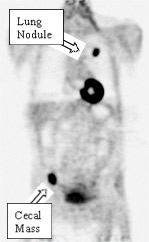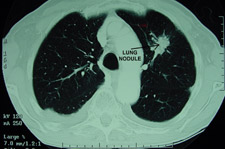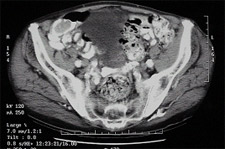Higher Sensitivity Often Provides Nore Accurate Diagnosis
The treatment options for various types of cancers have expanded in recent years, making early and precise diagnosis all the more important. Advancements in radiology allow doctors to identify cancers very early; for instance, full-body PET scans have a high success rate identifying solitary nodules in the lungs.
PET, or positron emission tomography, is an imaging test that uses radioactive tracers to produce detailed images that can reveal disease in the body. In addition to using these scans as a primary diagnostic tool, Main Street Radiology uses them to confirm cancers identified by CT scans and to locate secondary growths that the CT scan may have missed.
Case History: A 75-year-old male with a history of head and neck cancer underwent a CT scan of the chest (Figure 2), which showed a solitary 2 cm left upper lobe nodule. The patient was referred to Main Street Radiology for a PET scan.

Figure 1

Figure 2

Figure 3
Findings: A whole-body PET scan was performed demonstrating an intense hypermetabolic focus (Figure 1) corresponding to the pulmonary nodule seen on CT, indicative of carcinoma. A second abnormality was seen, within the right lower quadrant of the abdomen (Figure 1). In retrospect, a cecal mass is seen on the abdomen CT (Figure 3) corresponding to the PET scan finding, compatible with carcinoma.
Discussion: PET scanning has been shown to be an excellent tool in imaging solitary pulmonary nodules, with sensitivity reported at approximately 95%. The success of PET scanning has significantly reduced the number of negative biopsies and thoracotomies at many institutions.
As the number of PET scans performed throughout the country increases, reports of incidental tumors are surfacing. At a conference sponsored by American College of Radiology, experts in the field of oncological PET scanning report that colorectal and thyroid carcinomas are the most commonly discovered incidental tumors.
Colorectal carcinoma is one of the most common indications for PET scanning. Sensitivity for metastatic disease has been reported to be greater than 90%, much higher that CT or MRI. Including PET in the work-up of colorectal carcinoma will help both the oncologist and surgeon to select the most appropriate treatment.